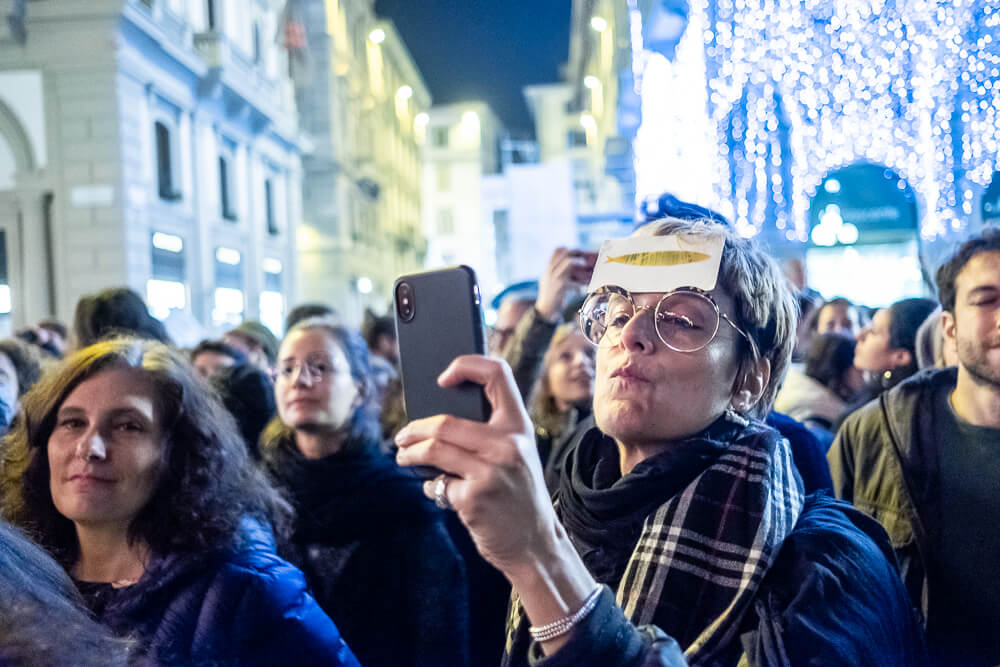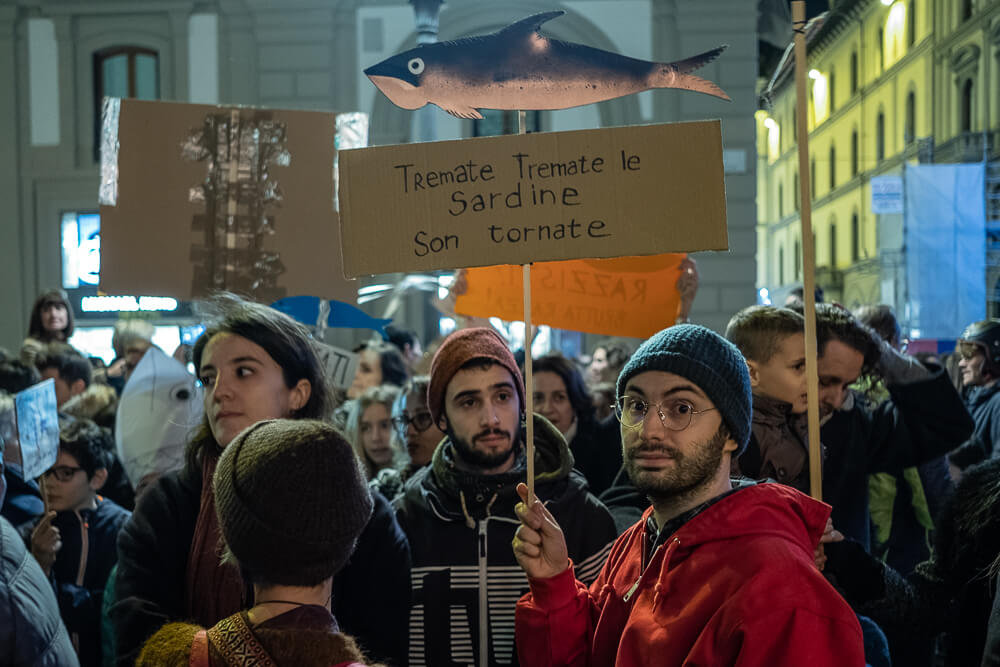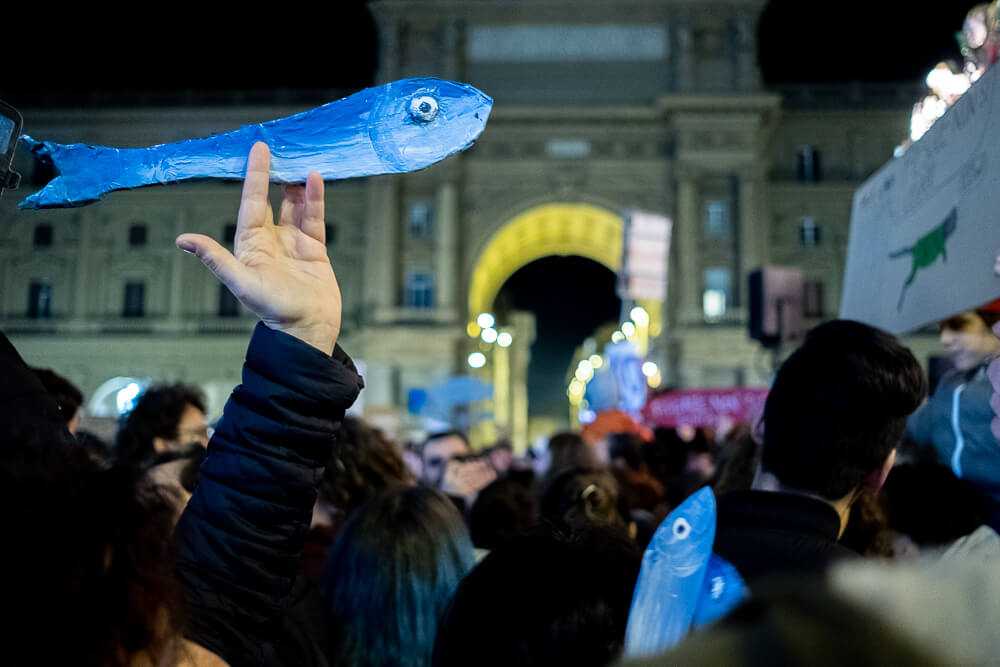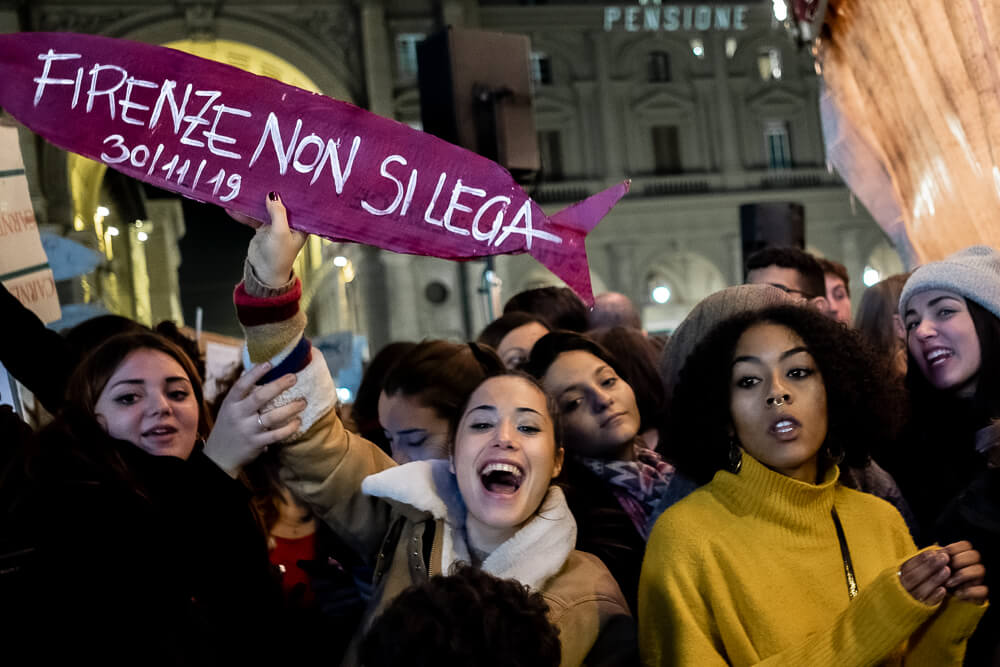The historian of Italy talks about social movements from the Berlusconi-era to the present, the doldrums in which the Italian Left has languished for many years, and the new democratic energies which have emerged in a strange and novel form in the country over the last few weeks. Who are the sardines and how long can they last?
Last November a new protest movement spread, quite unexpectedly, across Italy. At a first glance its participants seemed rather silly. The ‘sardines’, as they called themselves, occupied to overflow Bologna’s famous Piazza Grande, bearing images and placards of the eponymous fish, a symbol which, according to the organisers was to represent togetherness, non-violence and freedom on a massive scale. Over the next few weeks the demonstrators – mainly young, mainly from the service sector of the middle classes, high on education qualifications but low on jobs, repeated in an extraordinary fashion the Bologna feat. 90 piazzas were briefly occupied, the overall numbers involved in spontaneous protest being the greatest since the Second World War. The pre-eminent objective of the sardines was a simple one – to prevent the racist and fascist League of Matteo Salvini (running at around 33% in the national polls), from taking over the prosperous and leftist region of Emilia-Romagna in the upcoming regional elections. Their target, though, is not just the Lega, but the deeper corruptions of present-day political discourse and action, both on Right and Left.

As the participants prepare for a new year of mobilisations Jamie Mackay spoke with the historian Paul Ginsborg about the history of civil society movements in Italy, and the challenges ahead. Ginsborg is President of Libertà e Giustizia, the civil-society association which over the last twenty years has organised many actions in defence of the post-war constitution and the independence of the Italian judiciary.
The sardines appeared in huge numbers at the end of last year, apparently from nowhere. How can we understand their sudden emergence in relation to other recent historical examples?
That is a much more difficult question than first appears. By the time the sardines came into the picture Italy had been virtually written off in terms of popular movements. It seemed as if much of the rest of Europe was on the move but from Italy and from ‘Red’ Bologna, as it came to be called in the 1960s and 1970s on account of the strong left-wing political culture… just a long silence. There had been important middle-class mobilisations in the early 1990s; the Girotondi were a significant part of the anti-Berlusconi coalition of that time. But these were essentially defensive battles which never lasted long. The Popolo Viola, for example, which boasted seventy thousand young demonstrators at its first showing, dissolved within a month. And yet the Sardines are there, and that is in a sense extraordinary.
Waves like these either pick people up – all of us – or else you have to wait ten years to try again. Why this movement in particular has been picked up I don’t know. They’ve certainly used social media to the maximum. But if we are uncertain about causes, there can be no doubt about effects. They’ve interrupted the polls. They’ve already made Salvini dip a whole percentage point, which is big. Clearly, they’re serving some purpose.
One common criticism directed at the sardines is that they are essentially apolitical. At the demonstration in Florence there was a moment when someone hoisted a large communist flag above the crowd and everyone around shouted to bring it down. They’ve also rejected calls to ally with any party, or even to make one of their own. They respond that they are far from being apolitical but are rather apartitica, that is bitterly against the malpractices of the Italian political parties for many decades…
The movement is at its beginning and will evolve rapidly. At its heart is the rejection of violence. There has been a great, unspoken shift from the politics of militant groups like the Red Brigades in the 1970s to the cult of nonviolence and the massive espousal of pacifism. The sardines are completely ‘innocent’ in the narrow political sense, so their critics don’t know what to do. In times like these, pacifism itself is a radical agenda.

One of things I find interesting is how successful they’ve been in disrupting Salvini’s rhetoric. Predictably, his first response was to lash out: ‘I’ll set the cats on them!’ he said. But in the face of a movement that’s so inoffensive as you say, these remarks fell flat, even among his supporters. I’d agree the organisers have revealed how useful non-violence can be in bypassing the logic of right-wing populism. Is this enough, though, to open a new affirmative democratic space?
Here we come face-to-face with the possibilities of a new language of politics. The first element of an answer will depend a lot on the collective capacity to listen. In Italy no one listens to anybody else in political meetings. Instead they gather at the back of the room and conspire. We need a politics which is about the broadening of democracy, and the defence of its inner workings. All too often meetings end way beyond schedule and with the dominion of male activists late at night. It’s a shocking but perennial way of operating. If a movement is to mean anything, what you’ve just said about language must be applied to other areas. The turnover is terribly high. One of the most disconcerting aspects of social-movement politics is how people come and then disappear. They fly by night and we never see them again.
One notable exception to this dynamic would surely be the Five Star Movement (M5S) which in the space of just 10 years has gone from being a social movement to the largest political party in a government. On the face of it this force was also founded on a principle of direct democracy. How does their experiment relate to that of the sardines?
The M5S has failed, or is in the process of failing. This is what gives the sardines space to move. It’s extremely interesting to note how Italy has moved from traditional representative parliamentary government to M5S’s fixation on forms of participatory democracy. But they blew it in a big way. The overall impression they made was not of a genuine participatory model but rather of a false one, seasoned with reverential attitudes towards their leader Beppe Grillo. Then there’s the Rousseau platform, their organising platform, the inner mechanisms of which remain a hierarchal mystery. Here we meet trompe-l’œil democracy. Essentially, around thirty thousand members of the movement – which actually is much larger than that – use polls and questionnaires to decide the line of the party. Meanwhile the political line is clearly dictated by the leadership, which is made up of five or six people. It’s ironic and sad, but the much-maligned Partito Democratico’s (PD) system of having primaries – with two or three million people voting – is far more democratic.

The M5S and PD are now in government together, and facing imminent electoral oblivion at the hands of the far right. Now they’re desperately trying to take advantage of the impact the sardines have had on public discourse to absorb, manipulate and ultimately neutralise it. Will their efforts condemn the movement to an early demise?
I think that we can draw up a hit list of why the sardines are very vulnerable. These can essentially be grouped in two major areas: the first internal and the second external. In the first category come all the negative passions – jealousy, narcissism, the desire for control, personalisms of every sort, including that of the primacy of family interests. In the second we could point to all the institutions, their workings and language, political administrative government and people tied to parties, recommendations and so on. After it finishes it will be very easy for people to say I told you so.
I wonder, though, how people will characterise themselves after this movement finishes. The degree and nature of the failure will reflect people’s dual character. In one part of their heart or soul people can believe that a different Italy is possible. At the same time another part is entirely cynical about it. These two things can co-exist within the same individual, with one aspect being more likely than the other to weigh upon them as they go through a movement. Failure may well increase the amount of cynicism and resignation, but not before having created unforgettable moments and new energies. Eventually, the question remains: what are the mechanisms and proposals that can bring people together?

One of the positive aspects about the sardines’ distancing from conventional political divisions is their capacity to attract a vast and diverse constituency of participants. How can this kind of pluralism be sustained? What kind of politics would be required?
One future would entail a radical approach to reformism. This is one of the main concerns today in my opinion: what would a reformism mean that is not just about receiving top down benefits from the welfare state, and ever fewer of these as austerity becomes a permanent feature? Families desperately need these services, but one wonders, is there a possibility of inventing another sort of reformism, more political and participatory in which one reform acts as a sort of snowball for the next one? People of all kinds could perhaps come to understand that the realm of politics is not separate but rather intimately linked to every-day life.
![Political Critique [DISCONTINUED]](http://politicalcritique.org/wp-content/uploads/2015/09/Political-Critique-LOGO.png)
![Political Critique [DISCONTINUED]](http://politicalcritique.org/wp-content/uploads/2015/09/Political-Critique-LOGO-2.png)